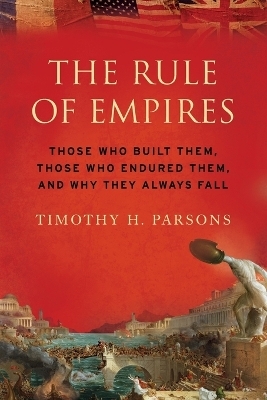
The Rule of Empires
Those Who Built Them, Those Who Endured Them, and Why They Always Fall
Seiten
2012
Oxford University Press Inc (Verlag)
978-0-19-993115-6 (ISBN)
Oxford University Press Inc (Verlag)
978-0-19-993115-6 (ISBN)
A grand account of the evolution of empire from its origins in ancient Rome to its most recent twentieth-century embodiment, The Rule of Empires explores the historical reality of subjugation and exposes the true limits of imperial power.
In The Rule of Empires, Timothy Parsons gives a sweeping account of the evolution of empire from its origins in ancient Rome to its most recent twentieth-century embodiment. He explains what constitutes an empire and offers suggestions about what empires of the past can tell us about our own historical moment.
Using imperial examples that stretch from ancient Rome to Britain's "new" imperialism in Kenya to the Third Reich, Parsons considers the features common to all empires, their evolutions and self-justifying myths, and the reasons for their inevitable decline. Parsons argues that far from confirming a Darwinian hierarchy of advanced and primitive societies, conquests were simply the products of a temporary advantage in military technology, wealth, and political will. Beneath the self-justifying rhetoric of benevolent paternalism and cultural superiority lay economic exploitation and the desire for power. Yet imperial ambitions still appear viable in the twenty-first century, Parsons shows, because their defenders and detractors alike employ abstract and romanticized perspectives that fail to grasp the historical reality of subjugation.
Writing from the perspective of the common subject rather than that of the imperial conquerors, Parsons offers a historically grounded cautionary tale rich with accounts of subjugated peoples throwing off the yoke of empire time and time again. In providing an accurate picture of what it is like to live as a subject, The Rule of Empires lays bare the rationalizations of imperial conquerors and their apologists and exposes the true limits of hard power.
In The Rule of Empires, Timothy Parsons gives a sweeping account of the evolution of empire from its origins in ancient Rome to its most recent twentieth-century embodiment. He explains what constitutes an empire and offers suggestions about what empires of the past can tell us about our own historical moment.
Using imperial examples that stretch from ancient Rome to Britain's "new" imperialism in Kenya to the Third Reich, Parsons considers the features common to all empires, their evolutions and self-justifying myths, and the reasons for their inevitable decline. Parsons argues that far from confirming a Darwinian hierarchy of advanced and primitive societies, conquests were simply the products of a temporary advantage in military technology, wealth, and political will. Beneath the self-justifying rhetoric of benevolent paternalism and cultural superiority lay economic exploitation and the desire for power. Yet imperial ambitions still appear viable in the twenty-first century, Parsons shows, because their defenders and detractors alike employ abstract and romanticized perspectives that fail to grasp the historical reality of subjugation.
Writing from the perspective of the common subject rather than that of the imperial conquerors, Parsons offers a historically grounded cautionary tale rich with accounts of subjugated peoples throwing off the yoke of empire time and time again. In providing an accurate picture of what it is like to live as a subject, The Rule of Empires lays bare the rationalizations of imperial conquerors and their apologists and exposes the true limits of hard power.
Timothy Parsons is a Professor of African History at Washington University. He is the author many books, including The British Imperial Century, 1815-1914: A World History Perspective, and The 1964 Army Mutinies and the Making of Modern East Africa.
Introduction: The Subjects of Empire ; 1. Roman Britain: The Myth of the Civilizing Empire ; 2. Muslim Spain: Blurring Subjecthood in Imperial Al-Andalus ; 3. Spanish Peru: Empire by Franchise ; 4. Company India: Private Empire Building ; 5. Napoleonic Italy: Empire Aborted ; 6. British Kenya: The Short Life of the New Imperialism ; 7. France Under the Nazis: Imperial Endpoint ; Conclusion: Imperial Epitaph
| Erscheint lt. Verlag | 8.11.2012 |
|---|---|
| Zusatzinfo | 7 maps |
| Verlagsort | New York |
| Sprache | englisch |
| Maße | 234 x 155 mm |
| Gewicht | 658 g |
| Themenwelt | Geisteswissenschaften ► Geschichte ► Allgemeine Geschichte |
| Geschichte ► Teilgebiete der Geschichte ► Wirtschaftsgeschichte | |
| Sozialwissenschaften ► Politik / Verwaltung ► Politische Systeme | |
| Sozialwissenschaften ► Politik / Verwaltung ► Staat / Verwaltung | |
| ISBN-10 | 0-19-993115-1 / 0199931151 |
| ISBN-13 | 978-0-19-993115-6 / 9780199931156 |
| Zustand | Neuware |
| Informationen gemäß Produktsicherheitsverordnung (GPSR) | |
| Haben Sie eine Frage zum Produkt? |
Mehr entdecken
aus dem Bereich
aus dem Bereich
Macht und Herrschaft im Zarenreich
Buch | Hardcover (2024)
C.H.Beck (Verlag)
CHF 69,85
wie die USA und China um die technologische Vorherrschaft auf der …
Buch | Hardcover (2023)
Rowohlt (Verlag)
CHF 41,95


